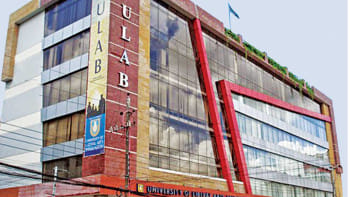Private Universities have a crowding problem

If your university was like a trade fair, riddled with people and you had no place to sit or walk, how would it affect you? Would you feel the urge to go to study there every day?
As they rise in the rankings, private universities are enrolling more students than ever. According to Bangladesh Education Statistics 2021, the number of students enrolled in private universities increased dramatically between 2019 and 2021, rising from 120,276 to a whopping 328,689, and there are no signs of the numbers slowing down anytime soon. This enormous increase in student enrolment raises more fundamental questions about accommodations and quality than it answers. Intake at private institutions in Bangladesh occurs in the trimesters of Spring, Fall, and Summer, with the Spring intake attracting the largest influx of applicants. Despite being a great option for aspiring students to pursue higher education, it is creating numerous issues for students currently enrolled.
According to National Center for Education Statistics (NCES - US), a facility is deemed to be overcrowded if enrolments exceed 5 percent of the capacity of the permanent infrastructure. A university campus, in the opinion of Zarin Subah, a student at the Independent University of Bangladesh, should be "a free and open environment where one can unwind after consecutive classes for a little sojourn". But trying to find a seat on the campus of the university is like trying to find Waldo.
"I can't find a place to study in between my classes. Everywhere I go, I find that the premise is noisy and crowded with people," confessed Maliha Bushra, an undergraduate student at a reputable university.
Overcrowding in classrooms can have a detrimental impact on teachers' capacity to teach efficiently and students' ability to learn, leading to less individualised learning, more distractions, and disciplinary issues. The University Grants Commission (UGC) announced a restriction on the number of seats available at private universities on November 20, 2019. Each course would be limited to 60 students, and 50 for those that included labs. The UGC included a provision allowing universities to increase the number of seats available with official approval. However, many opposed this idea, claiming that this would be unfair to a large fraction of the existing students. Later, the Commission's chairperson stated that a university's capacity to offer high-quality education will determine how many students it can admit.
Apart from the insufficient space to saunter, transportation is also a significant problem for many students at private universities. It's frustrating to wait in seemingly never-ending lines but still be unable to board the bus.
"I spend roughly four to five hours of my day on the roads," Abdullah Al Masud from United International University explains. "I am frequently late to classes, and getting home takes up most of my day."
A senior at Ahsanullah University of Science and Technology, Mahib Hossain advocates boosting the number of elevators in educational institutions. "I don't think the elevators are equipped to bear the load of so many people. More of them should be installed to accommodate the growing mass of students," he added.
Sinthia Sabrin*, a sophomore at North South University, complains that she needs to leave the campus to get food because of the cafeteria's ongoing congestion. "This is often not feasible, especially when I have back-to-back classes," she adds.
A lot of private universities still operate from outer campuses. A recent notice from UGC warned private universities to move to permanent campuses immediately before the start of the new year.
Naima Ahmed Nup, majoring in Computer Science at a well-known institution says, "It really isn't feasible for my university to be enrolling so many students every session. As things stand, there are only a few buildings with no fixed campus. As a result, not only does it impact the existing students but also those who live nearby. There is no place to stand and not to mention the unusual rush of traffic and elevator lines. Most importantly, can the university authorities maintain the quality of education with such a big student body? I don't think so. If you look at the ratio of permanent faculty and contractual faculty, the matter can be estimated to some extent."
Like Naima, a lot of other students share the same concern. A student from North South University said, "The authorities must make sure they have enough space for all the students. Otherwise, it will take a toll on both the environment of the university as well mental well-being of the students."
On the other hand, some are open to the prospect of a large intake, provided that the university can assure to provide the right facilities without compromising on the quality of education. However, managing such a large student body is an arduous task in and of itself.
Shafin Mahmud, a senior at BRAC University, pointed out a huge issue that comes with this mammoth crowd, "One thing to be concerned about is how unkempt the campus looks. The staff cannot keep everything under their supervision and littering has skyrocketed inside the campus."
Almost all the students believe that limiting the number of seats for intake per semester should be heavily implemented and that student screening is absolutely necessary.
Shafil Alekram, studying at the University of Liberal Arts Bangladesh, stated, "Although it is good that everyone is getting a chance to attain higher education, I believe that not everyone should be given that opportunity without proper evaluation of their qualifications."
He also emphasized how hard it is to get the desired courses because of this overflowing crowd. Tonuka Tunazzina Chowdhury, a microbiology student from BRAC University agrees with Shafil. "During pre-advising, the majority of students are unable to enrol in the desired courses or schedule, which has an impact on their academic plan," she says.
The students have a clear demand, "Take less or make space."
*Names have been changed upon request.
Farnaz Fawad Hasan is a disintegrating pool noodle wanting to stay afloat. Reach her at [email protected]

 For all latest news, follow The Daily Star's Google News channel.
For all latest news, follow The Daily Star's Google News channel. 











Comments